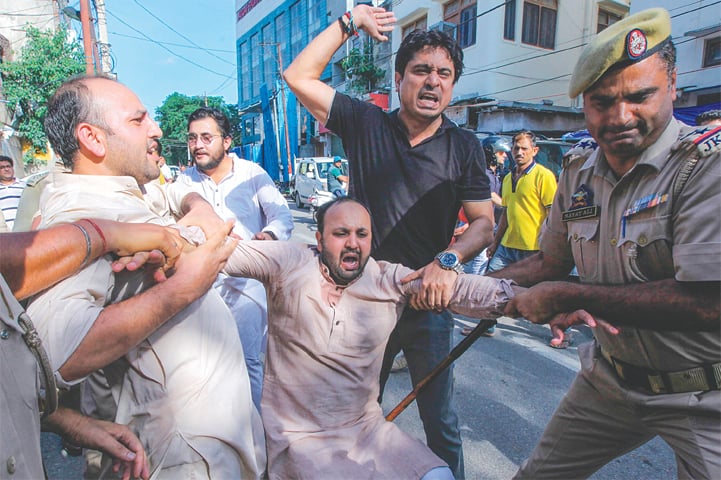
SRINAGAR: For the first time in six days, Indian authorities eased travel restrictions in some parts of Srinagar on Saturday, and people flooded the streets of India-held Kashmir’s main city to buy provisions ahead of Eidul Azha on Monday.
But with internet and mobile and landline telephone connections still severed in most parts of the disputed region, many people were still struggling to make contact with relatives.
And some homeowners and city workers were left to clean up Srinagar’s streets on Saturday, a day after police used tear gas and fired pellets to control a protest after Friday prayers over India’s withdrawal of special rights for the Himalayan state.
Seeking to tighten its grip on the region, New Delhi on Monday scrapped its right to frame its own laws and allowed non-residents to buy property there.
The Indian government also locked down the region, cutting off communications, detaining more than 500 political leaders and activists, and putting a curfew into force with numerous police and army roadblocks stopping movement by many residents.
Huge protest held in Srinagar on Friday against Indian move to revoke special status of Jammu and Kashmir
Signs of Friday’s protest — the largest since India’s clampdown — were visible in the Soura area of Srinagar on Saturday.
Large rocks, wooden platforms, poles and boulders blocked the main street, and shops were shut. Protest graffiti — including calls for “Azadi (freedom)” — were visible.
Reuters reported at least 10,000 people were involved in Friday’s protest, based on an estimate provided by a police source and backed up by two eyewitnesses. Another official source on Saturday gave Reuters the same estimate.
In a tweeted statement, the spokeswoman for India’s Ministry of Home Affairs, Vasudha Gupta, said that the estimate of 10,000 was “completely fabricated & incorrect”.
Reuters was unable to reach Gupta for further comment.
Video footage carried by international news channels, the BBC and Al Jazeera and available online, appeared to show very large crowds protesting in Srinagar on Friday.
In the Bemina area of western Srinagar, around a dozen residents said that security forces had thrown stones and bricks at homes and cars in retaliation for the protests, breaking windows as a result.
The Indian government did not immediately respond to a request for comment about the alleged incident. Reuters was not able to independently verify the residents’ claims.
“Why is India doing this to us?” said an elderly man, Mohammed Sultan, whose truck that he used to transport goods and earn a daily wage was damaged.
Pointing to his two young grandsons, he said: “How do I do my work and feed these people now?”
Another woman screamed: “Is this how Modi is going to bring development to us?”
Many people sought out the few policemen who have been provided with mobile phones. At a crossroads in Srinagar’s Nowhatta area, a police official said around 78 people had used his phone on Saturday to contact relatives outside occupied Kashmir.
Inside a second-floor meeting room at Srinagar’s district administration office, more than 100 people crowded around two mobile phones to make calls outside the valley.
An official there, who declined to be named, said 354 people had registered their names to use the phones.
Babli, who only gave one name, rushed there to try to call her son and daughter, both in Delhi, whom she had not been able to speak to since the blackout began on Sunday night.
“My serial number is 309, I do not know when I will be able to talk to them,” she said.
Narendra Modi’s Hindu nationalist Bharatiya Janata Party (BJP) has long campaigned for abrogating Kashmir’s special privileges in the Indian constitution.
International rights groups, including Amnesty International, have urged the government to end the communications blackout.
The Editors Guild of India on Saturday issued a statement saying it was impossible for journalists to cover developments in Kashmir without internet access. “Media transparency has and always should be India’s strength, not fear,” it said.
Congress member of parliament Rahul Gandhi called on the government to respond to reports of violence in Kashmir and provide more information about the situation on the ground.
Published in Dawn, August 11th, 2019













































